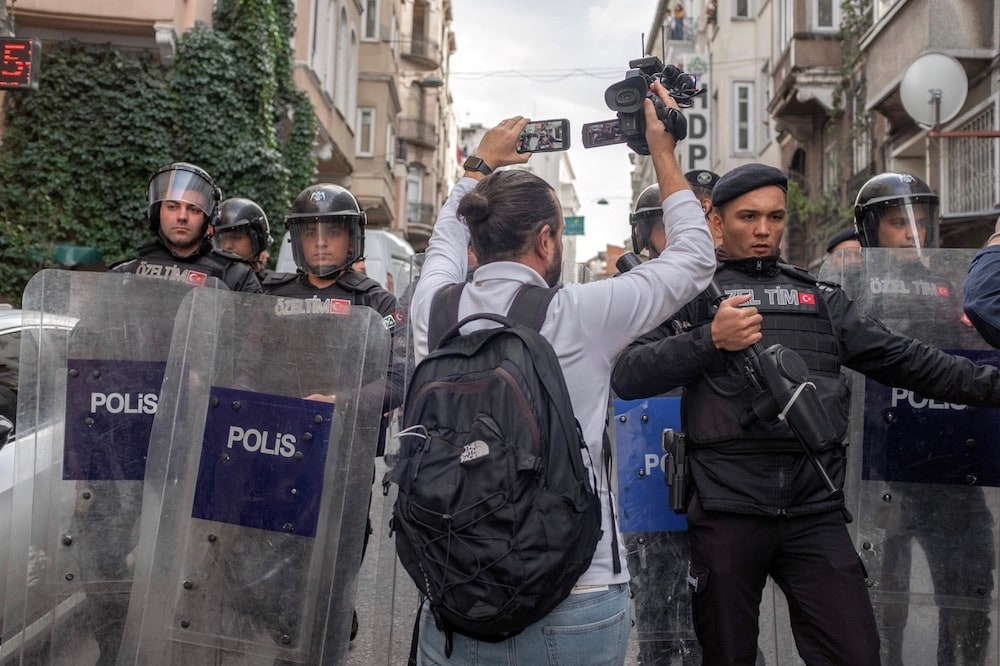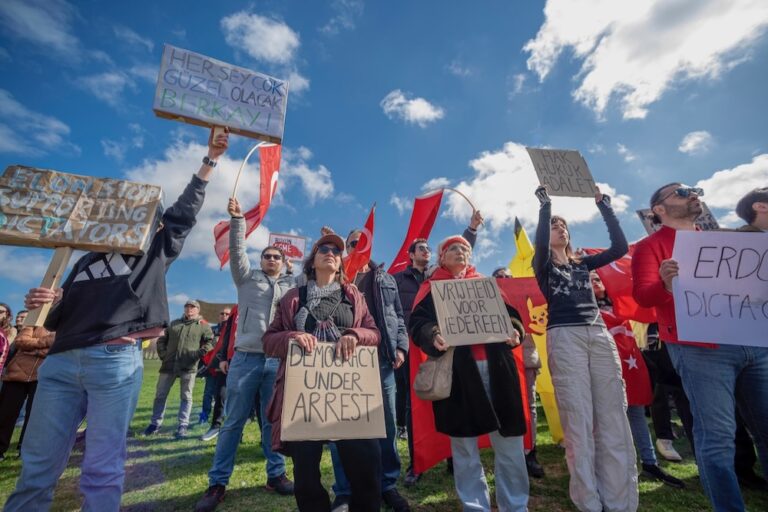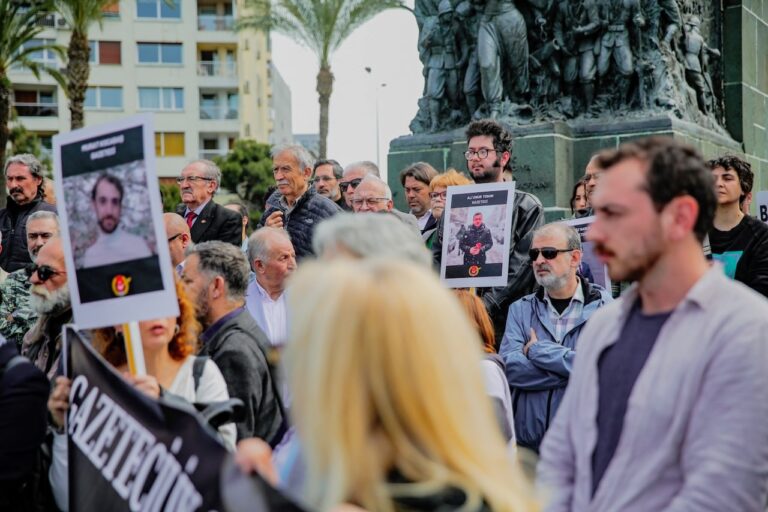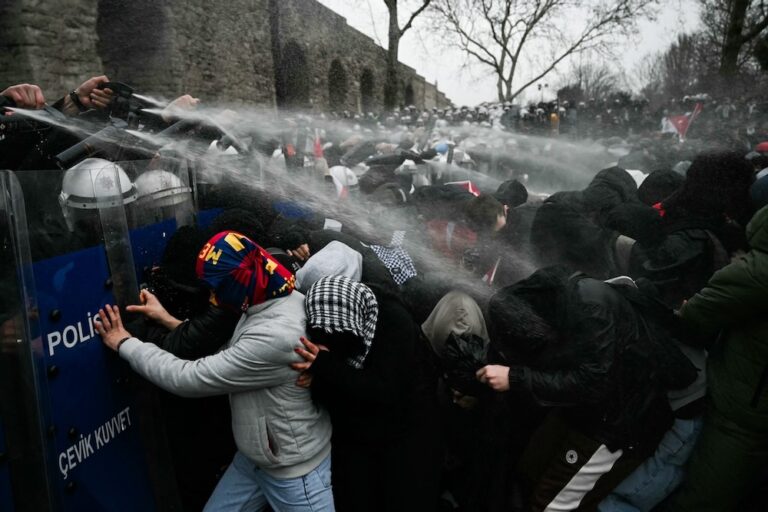Journalists continue to face harassment, arbitrary imprisonment and prosecution. Those responsible for attacks and threats against the press enjoy alarming levels of impunity.
This statement was originally published on freeturkeyjournalists.ipi.media on 5 October 2023.
Five international press freedom and journalism groups conclude press freedom mission to Turkey
Turkey’s press freedom crisis has deepened further in the last year. Journalists face steep harassment and intimidation for their work, including arbitrary imprisonment and prosecution. Those responsible for attacks and threats against the press enjoy alarming levels of impunity.
This year’s parliamentary and presidential elections have brought no relief for press freedom. On the contrary, pressure continues to mount on critical journalists ahead of next year’s municipal vote, including mayoral elections in Istanbul and Ankara. And the tragic February 2023 earthquakes laid bare efforts by authorities to control news and information, with local media being particularly targeted.
This week, five international media freedom and journalism organizations met with a range of key stakeholders in Turkey, including journalists, civil society groups, the Turkish Constitutional Court, the Radio and Television Supreme Council (RTÜK), and diplomatic representatives, including the EU Delegation, to discuss Turkey’s media freedom crisis. The delegation also met with members of parliament of the Republican People’s Party (CHP), Democracy and Progress Party (DEVA), Green Left Party (YSP), and Labor Party (EMEP). The delegation also monitored the trial of Tele1 Editor-in-Chief Merdan Yanardağ in Istanbul on October 4.
Led by the International Press Institute (IPI) and IPI’s Turkey National Committee, the mission included representatives from the Committee to Protect Journalists (CPJ), the European Centre for Press and Media Freedom (ECPMF), Osservatorio Balcani e Caucaso Transeuropa (OBCT), and Reporters Without Borders (RSF).
The mission’s requests for meetings with the Minister of Justice Yılmaz Tunç, Minister of Interior Ali Yerlikaya, head of the Turkish Parliament’s Chair Human Rights Investigation Commission Derya Yanık, head of the Digital Platforms Commission Hüseyin Yayman, head of the Justice Commission Cüneyt Yüksel, RTÜK Chair Ebubekir Şahin and Fahrettin Altun, the head of Directorate of Communications, were left unanswered. The mission regrets not having the opportunity to engage in dialogue with key public officials and public authorities responsible for upholding fundamental rights and the rule of law and ensuring media freedom and pluralism in the country.
A key topic of this year’s mission was Turkey’s disinformation law. Last year, the AKP head of the Human Rights Investigation Commission of the Turkish Parliament assured our delegation that disinformation law would not be used to punish journalists. But in the past year, at least 20 journalists were targeted (with three jailed) on the basis of the disinformation law, mainly in relation to coverage of the earthquake.
Physical safety remains an issue of grave concern. In meetings with journalists, the delegation heard alarming examples of threats to reporters’ safety with authorities in some cases turning a blind eye, failing to uphold their duty to conduct an effective investigation and provide safety measures. Meanwhile, politicians, government authorities, and the courts continue to equate critical journalism with “terrorist propaganda”, disinformation, or a threat to national security, further increasing journalists’ physical and legal vulnerability.
Journalists targeted with legal harassment continue to face egregious violations of rule of law guarantees. The systematic use of pretrial detention for journalists has now become the norm, effectively resulting in punishment without conviction. Recent cases have seen Kurdish reporters jailed for over a year pending trial following mass arrests.
The granting of official press cards remains arbitrary – and their power is limited in the face of information control. Independent journalists fortunate to receive such cards reported that they were in some cases prevented by authorities from reporting in the earthquake zone despite providing their credentials.
The Constitutional Court continues to issue important rulings in support of press freedom. However, it is hampered by a lack of resources, a failure by lower courts to implement the Court’s rulings, and a failure by the Turkish Parliament to introduce legislation addressing systematic violations identified by the Court.
Local elections are due to take place in Turkey in March 2024. The free flow of independent news and information is an essential condition to any democratic election. We call on the government of Turkey to guarantee that journalists are able to do their work free of intimidation and harassment in particular during the election period.
Finally, amid the continued crackdown by the Turkish authorities, the delegation notes with concern a pattern of visa denials, delays, and arduous procedures for Turkey journalists applying for visas to Europe. This trend undermines the ability of Turkey’s journalists to build and sustain links to their peers abroad. The delegation calls on European governments and the EU to maintain firm and active support for Turkey’s free press. In addition to strong and clear public support for independent journalists, this must include ensuring that journalists’ applications for visas for professional purposes are fast tracked.



